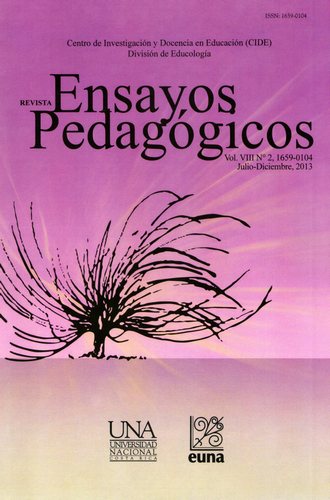Inclusive Academic Practices in the University Classroom: Interchangeable Learning
DOI:
https://doi.org/10.15359/rep.8-2.5Keywords:
inclusive practices, cooperative work, tutoring, activitiesAbstract
In our university classrooms, there is an imperative need for implementing new educational practices that allow all students to participate actively and equally in the learning process. A change is required in the teaching-learning methodology to assure a more cooperative, inclusive, dynamic, and fair learning process based on by team work and peer support with tutoring given by students to their classmates. This practice not only benefits the student facing some difficulties, who learns with the support of one of his/her classmate but also brings advantages to the student that teaches because with this, knowledge is reinforced, and thus when he or she teaches, he or she learns. When this practice is promoted, values such as solidarity, cooperation, responsibility, harmony, and friendship are shared among all the participants involved in the process. This article supports a cooperative learning process enriched with activities that value team work and tutoring among students, seeking a significant, effective, and interactive learning process that can lead to a more integral education of the learner.
References
Aronson, E. ( 2000). The jigsaw classroom. Recuperado de http://www.jigsaw.org/
Durán, D. 2003). Una experiencia de tutoría entre iguales, método de aprendizaje cooperativo para la diversidad. Trabajo presentado en el Congreso Internacional: una escuela para todos. Barcelona. Recuperado de http://www.aieteikastetxea.org/wp- content/uploads/2011/07/ponenciablanquernacast1.pdf
Echeita, G. (2005). Perspectivas y dimensiones críticas en las políticas de atención a la diversidad. Revista Alambique: Didáctica de las ciencias experimentales, 44, 7-16. Recuperado de http://www.uam.es/personal_pdi/stmaria/sarrio/DOCUMENTOS,%20ARTICULOS,%20PONENECIAS,/Atencion%20a%20la%20diversidad.pdf
Johnson, D y Johnson, R. (1999). Aprender juntos y solos. Recuperado de http://terras.edu.ar/jornadas/3/biblio/3JOHNSON-David-JOHNSON-Roger-Apendice.pdf.
Kagan, S. (2001) Cooperative learning structures can increase student achievement. Recuperado de http://www.kaganonline.com/free_articles/research_and_rationale/311/Cooperative-Learning-Structures-Can-Increase-Student-Achievement
Ley 7600. (1996). Igualdad de oportunidades para las personas con discapacidad. Recuperado de http://wvw.nacion.com/ln_ee/ESPECIALES/documentos/2003/mayo/29/ley.pdf
Meléndez. L. et al. (2012). IV Informe Estado de la Educación. Programa Estado de la Nación en Desarrollo Humano Sostenible. Informe Final. Desarrollo y Desafíos de las Adecuaciones Curriculares en el sistema educativo costarricense. Costa Rica. 4-120 Recuperado de http://www.estadonacion.or.cr/files/biblioteca_virtual/educacion/004/melendez-et-al-adecuaciones-curriculares.pdf
Mosca, A y Santiviago, C. (2009). Tutorías entre pares. Recuperado de http://www2.compromisoeducativo.edu.uy/sitio/wp-content/uploads/2013/10/librotutorias.pdf
Naradowski, M. (2008). La inclusión educativa. Reflexiones y propuestas entre las teorías, las demandas y los slogans.
Revista Iberoamericana sobre Calidad, Eficacia y Cambio en Educación, 6(2),19-26. Recuperado de http://www.rinace.net/arts/vol6num2/art2_htm.htm
Pujolàs, P. (2002) El aprendizaje cooperativo algunas propuestas para organizar de forma cooperativa el aprendizaje en el aula. Laboratorio de psicopedagogía. 3-39. Recuperado de http://www.deciencias.net/convivir/1.documentacion/D.cooperativo/AC_Propuetasorganizativas_Pujolas_39p.pdf
Pujolàs, P. (2006). Aulas inclusivas y aprendizaje cooperativo. Recuperado de http://www.octaedro.com/pdf/10062.pdf
Simon, C. (2014). Rotating reviews. Recuperado de http://www.readwritethink.org/professional-development/strategy-guides/brainstorming-reviewing-using-carousel-30630.html
Stainback, S. (2001). Classroom contextual considerations. Recuperado de http://www.sig2.hawaii.edu/resources/briefings/topic6/articles.php
Topping. K. (1996). The effectiveness of peer tutoring in further and higher education: A typology and review of the literature. Recuperado de http://www.fau.edu/CLASS/CRLA/Level_Three/ The_effectiveness_of_peer_tutoring_in_further_and_higher_education-a_typology_and_review_of_the_literature.pdf
Topping, K. (2000). Enseñanza: 5 prácticas educativas. Recuperado de http://www.ibe.unesco.org/publications/educationalpracticesseriespdf/prac05s.pdf
Traver, J. (2003). Aprendizaje cooperativo y educación intercultural. Revista Educación intercultural: La diversitat cultural a l’escola, 1-29. Recuperado de http://centros.edu.xunta.es/cfr/pontevedra/oblogdeorientacion/toni/toni5.pdf
UNESCO. (2009). Directrices sobre políticas de inclusión en la educación. Recuperado de http://unesdoc.unesco.org/images/0017/001778/177849s.pdf
Downloads
Published
How to Cite
Issue
Section
License
Ensayos Pedagógicos is subscribed to the Attribution-NonCommertial-NoDerivatives 4.0 International Creative Commons Licence, which allows both authors and readers to freely download, store, copy, and distribute the final approved publisehd version of the manuscript (post-print) as long as this is done without commercial purposes, no derivative works are generated, and the source and author are mentioned. As well, Ensayos Pedagógicos declares that authors will remain the rightful owners of the copyrights of their work in perpetuity.







